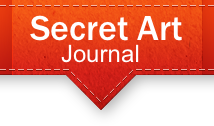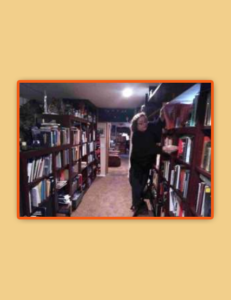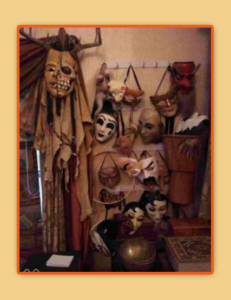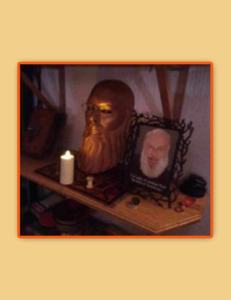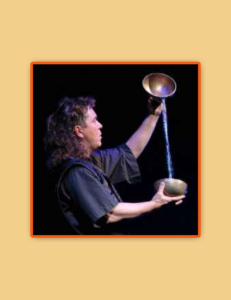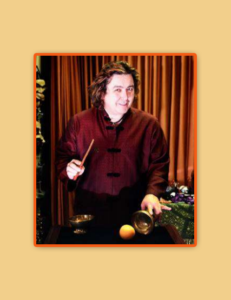

A visit to Mystery School and an interview with Jeff McBride by Av Dag Lofalk
I was in Las Vegas and had been in contact with Jeff McBride who had promised to set up and give a quick tour of his house and site of the Mystery School. Mystery School is a concept that he developed to support interested in magic and those who want to further develop their technique and presentation skill in the field of magic.
Me and Kim Gordon who drove the car were searching for the correct address when we were looking for Jeff McBride’s house.
We arrived at a small street a bit southeast of downtown Las Vegas and saw a large house with a well-appointed driveway. There was a street lamp on which it hung a mask of a human face so we understood that we were right.

Jeff McBride is well-known for his act of various masks that are constantly changing during his classic stage show.
I was visiting Las Vegas and on my way to visiting Jeff McBride to make an interview and hear him tell me a little about Mystery School.
After we parked the car we went up to the entrance which consisted of a door with different mysterious symbols of varying kinds. There was the symbol of Mystery School and several other occult and esoteric symbols related to the origin of magic.

I got there at the end of the day and met in the door by several of the people studying at Jeff. It was a varied group consisting of everything from teens to people who must have been closer to 80 years. Common to them is that they want to develop within their particular area of interest of magic.
Mystery School is a project that Jeff started 26 years ago and has grown and become a great source of knowledge and inspiration for all the students who have passed through the mysterious halls of Mystery School.
It began almost 30 years ago when Jeff contacted Eugene Burger and told him to create a slightly different congress for magic as an art form. **
Jeff McBride had an early contact with Eugene Burger, who was his mentor, and Jeff was constantly developing during his time as an artist, including with the help of Burgers. Now he wanted to develop further and help others move on in developing their magic
Jeff wanted to study with a master. He had noted that many learned magic from books and videos, but to further develop, he felt that it was best to study with a teacher.
He contacted Eugene Burger and started working with him.
Mystery School started around 1992 for the first time, especially since it opened to anyone who was interested in learning more and developing in magic and presentation.
We were welcomed by Jeff and had a short trip through the house with the different halls. There was also the library that lay behind a bookshelf that looked away after pronouncing a secret password.
Dag: Can you tell me a little about how you put up at Mystery School?

Jeff: We have a few different categories and they are, Trickster, Sorcerer, Oracle & Sage.
Trickster – Is about fitness training, for amateurs or those who recently started with magic.
Sorcerer – Directs to those who work with salon and stage magic or professional close-up magic.
Oracle – Is for those who engage in mentalism or mind reading.
Sage – For collectors, writers, magic teachers or historically interested
For example, we have a course in “Street Magic”, which is a course for a mixed group of students. They can be businessmen, amateur worshipers or professionals. They may, among other things, visit “The Strip” and Freemont Street to see the various street performers appearing there. How they act, builds an audience and sends around their hat to earn money. It’s a great way to earn money and travel around the world.
Dag: Many of the students at Mystery School are women. Is not that unusual? It usually seems to be men who are in the spell of magic?
Jeff: It’s probably mostly within Western culture that it looks like. In many other cultures, it is much more common with female magicians. I also think there will be more and more women who are going to devote to magic in the future. Women also have a more varied view of the stomach and often have a bit of different acts.
In addition, the Internet has liberated the magic so that it is available in a different way for everyone, both women and men interested in magic around the world.
We also hold the course “Sisters of Mystery” with Abigail Spinner McBride as an instructor, which is only for women. With topics like what it’s like to be a woman in the magic world, challenges and how to handle them, how to handle men, what effects are best for the best, etc

Dag: How would you describe a typical student studying at Mystery School.
Jeff: There’s actually no typical student at Mystery School. Our students come from every possible place. We have everything from housewives to lawyers like students here. Among other things, for example, former head of the CIA. We have teens who want to prepare for a magical competition. We had a young guy who was 12 years old when he started studying here and later won the first prize in “Americas Got Talent”. His name is Mat Franco. I have worked with people like Aaron Crow with an act that later won the competition in FISM. I have worked with several different competitions, but many people I worked with are 40, 50 and 60 years old. They are people who have returned to the stomach after engaging in other things for a long time. Now they return with the ambition to re-enter magic and to become as professional and successful in the magic as they have been in their professional life. So I help them create a second career within magic, whether they intend to work in charity or become full-time artists.
Dag: Can you mention any other courses you have?
Jeff: A course we arrange here in Las Vegas is “Masterclass for Mentalists” with Ross Jonson. A very popular rate that will be fully booked almost immediately. Ross was a student of Al Quran and has more than 30 years of experience in showbiz and mental area.
(In a you tube clip from the course, Pelle Tornell from Sweden tells about his experiences and experiences.) https://youtu.be/ylcFxxTLAEI?list=PL6442DC5C5D779359
Dag: How do you work with the students?
Jeff: We concentrate on finding and defining each student’s natural conditions. Then it’s going to develop and fine-tune them.
First, you need to be a good presenter then work on developing and refining his technique. Your technique must be so good that you do not need to think about the technology you are using. If you do not keep eye contact with the audience when you take a grip, you’re not ready to do that grip.
A magic routine must suit you and work with your personality
Some people like and want to perform certain effects or practices but they do not interact well with that particular routine.
Some try Mentalism but they do not make it work, others do a pigeon but miss and expose charges, etc. The effect is bad for their personality.
Dag: How do you solve the problem, how do you find the right act for the student?
Jeff: It is about finding the student’s natural conditions. Some are good at talking, for others, they are better off making a silent act of music until they develop their ability to make a spoken act. Keep in mind that you are talking to someone under 30 years of age who had a white-faced face and did not speak on stage.
Dag: How did you handle it?
Jeff: It took a long time to get out of that person and at first it was difficult. I was really bad when I was talking. I was comfortable and good when I was crazy but bad when I talked and it lasted almost 10 years before it got better.
It is also important to get the instructions you get. If Eugene told me to do something, I did just what he said.
Dag: Eugene Burger left us a short time ago. He was one of my favorite writers. His books featured central subjects in magic as art form and how each wizard could work on himself and his act to become a better artist. He was also the principal of the Mystery School. I think many who saw him do the effect of how the Indian gods destroy and restore our universe never forgets it. (Hindu or Gypsy tread can be traced back to the 16th century) https://www.youtube.com/watch?v=eFosK12_k5U
Jeff: Yes, he was a certain man who meant a lot both for my development and the development of the magic art form.
Dag: Are there any requirements at a certain level before you can learn at Mystery School?
Jeff: You do not need any prerequisites to start studying at Mystery School. It is enough that you are interested and have a will to learn.
We had a woman at the age of 60, Wanda, who worked at various corporate events where she walked around like a mascot in a big headed animal suit. She did not like her job. She had no knowledge of magic but received a scholarship and studied at school. After six days she had two own magic acts she could work with. A family performance and a close-up act. Now she no longer had to work as an animal mask and she got better paid than before.
Another special course on MS is Medicine and Magic. It addresses the relationships between medicine and magic. It is aimed at those who work in the field of health care and show the connections between magic and healing in different ways.
I also had the opportunity to speak a little with Jordan who works as a “Student Facilitator” at Mystery School and helps Jeff in different ways. He is studying at school with the help of scholarship, and he also helps with Copperfield’s museum in secret location in Las Vegas until 02:00 the night before being in place at school at 09:30 in the morning.
Dag: Can you tell me a little about how you got to school?
Jordan: I was told about Mystery School through IBM and Jeff held a “Masterclass” in my hometown and when I moved to Vegas, I felt I needed to develop and the best way to do it was to study for Jeff.
I participated in the three-day “Masterclass” with the help of a MS scholarship and on that road it is. I also did the “Magic & Meaning” conference and another course, then I started working on MS administration.
Dag: How would you describe the education at school?
Jordan: It is a unique education that is essentially between teachers and a student, or sometimes two or three students. This allows focus on each student’s needs and interests while providing flexible and versatile teaching that is well suited to each student.
Dag: Can you mention something about your most important experiences from the education?
Jordan: One of the most important experiences is probably that you have to go out and behave as much as possible. To stand in front of an audience and introduce yourself. That it’s ok to be bad to gain experience and learn to get better. You can never be perfect at the beginning. You have to do a few hundred shows for people to get in your routine and take off your act. When I started here, I was doubtful if I would like to introduce something and my friends said that “you must perform an effect.” If you have any effect or routine you are working on, this is the right place to get feedback and support in develop. It does not matter if it’s bad because it’s a start that you can work with. It is not uncommon for the artist to be locked in a certain way of acting, and then it may be good to have new approaches and ideas that you can try to see if it works better.
Dag: So the performance of the presentation itself is a very important part.
Jeff: There are three important parts. It’s the technical bit, the actual trick. Whether it’s a complicated or simple technique, it’s a method you need. There are simple methods that can be very illusory and there are complicated methods that can also be illusory. But if you give yourself a complicated method without being completely confident in the technology then you will fail. We teach people to become successful artists and second-hand technical specialists.
Here comes collectors, amateurs and writers but if they are to occur, we need to learn them self-assurance, presentation and simple techniques.
The biggest problem arises when students use techniques that they do not master. They saw a trick they liked and they want to do that require a volt and a double lift but they do not manage the technology. If, instead, they studied a book like John Bannons, “Destination Zero” and learn to present magic without technical grasp, they will succeed better.
My philosophy is that if you lose eye contact with your audience when performing a grip, you should not take the grip. You can practice the grip at home, but when you appear, just do what you are absolutely sure. When you’re adept enough on a technique so you do not have to worry about doing it then you can give up on technically complicated routines and manage to entertain with them. Because if you do poor manipulation, you do not entertain anyone but just fool yourself. There is a lot of it. I see many people appearing with effects as they fail technically. They should take a step back and work with their presentation, their script, their audience contact and the skill of time. Too many believe that magic is about grip, trick, technical skill, etc. and there’s a lot of things like that, but it’s just as much about the presentation.
Dag: Is not it really more about the presentation?
Jeff: No, it does not.
Dag: Why not.
Jeff: Tamariz tells a story of a nice dinner at a big mansion. You get a beautiful written invitation, they pick you up with a stylish limousine that transports you to a luxury house. The stairs up to the gate are illuminated by candelabra, when you open the gate it is full of flowers, an orchestra playing live music.
The host and hostess welcomes you and brings you to the dinner table where the food is served. But the food tastes terrible. The food is technology Everything else is presentation and if the technology does not match the presentation, you can have as much flowers, music and light as you like, but it will not be a good idea.
Dag: I understand what you mean, at the same time, I think many focus far too much on technology and forget about the presentation.
Jeff: They focus on hard technology, that’s exactly what I’m saying.
Dag: And they demonstrate technicians instead of a thorough presentation.
Jeff: And that might be ok for that kind of act. Here we focus on finding the natural conditions that each student has. We do not teach everyone to do the same effects. We are concentrating on developing Jordan, in his style, his interests, his passions. Or how Jordan? It was one of your exercises today, what are your passions, interests and other experiences. So we spend a great deal of time developing the presentation of the act, the character, and the techniques needed to match such an act and such personality.
When you become more confident then you want to behave more. But then it’s important that you appear with presentations and techniques that you are sure to continue building your act and your confidence.
Dag: How do you do if you want to come here and attend school classes?
Jeff: Then you call me or send an email and we’ll fix it.
Dag: Thank you for taking the time to meet us.
++++++++
All of these courses are held in Las Vegas and it may seem a long way to get around, but today’s air fares make it affordable. Among other things, Norweigan has very low prices to the United States and is suitable for low season so there are not many thousands of chips it’s all about. A visit to Mystery School and Las Vegas with all the shows you can see there is definitely worth a visit.
Mystery Skype School
In addition, there is another way of attending seminars and courses. Jeff has started an interactive school on the internet.
There you can have access to seminars and lectures for an affordable sum. There are also interactive classes through different technical solutions where you can see and talk to each other via the internet. This way, you can get a personal instruction and help with their effects and act in real time with Jeff or another of the school’s specialists. The only downside is that you need to be able to help English. But because it’s interactive video where you can show what you do and look at how the teacher instructs, that should be alright.
In addition, it is a fairly low amount to begin with. First, you can start with a free trial period, and start the membership at 25USD / year and for 100USD / year you have full access to all activities. 100USD equals about 70 kr / month, so most people should be able to cope, but if you have a very bad economy you can apply for a scholarship for the studies.
There is also an interactive classroom where classes are held every Monday in real time. Because the United States is in another time zone, active participation in the class becomes quite late at night. But the lesson is also recorded so that you can see the same lesson afterwards even if you do not have the opportunity to join in and ask questions.
URL below.
http://virtual.magicalwisdom.com/members/signup
I have had contact with several of the teachers involved in the development of Mystery School.
Among others, Lawrence Hass, who has written the book “Transformations: Creating magic out of tricks”, a book on how to create good presentations, among other things. He is a professor of humanities in Texas and lectures on magic and philosophy. He has also succeeded Eugene Burger as dean of the Mystery School.
George Parker is located in Belgium, lectures on creativity, including “Stop repeating your past. Start practicing for the future “. He has also written a book “INDEX-terity” about different ways to use an often underestimated tool within magic; the index.
Another great book “beyond deception” was written by Tobias Beckwith who also contributes to the knowledge of Mystery School with his long experience of theater, acting and directing including several Broadway sets. In the book he describes several different theater techniques that can enhance the originality, creativity and strength of your presentation. The book was very appreciated and I’m not sure if it’s available today. However, there is a part 2 that contains even more information and I can recommend.

